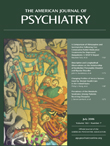Family Focused Grief Therapy: A Randomized, Controlled Trial in Palliative Care and Bereavement
Abstract
Objective: The aim of family focused grief therapy is to reduce the morbid effects of grief among families at risk of poor psychosocial outcome. It commences during palliative care of terminally ill patients and continues into bereavement. The authors report a randomized, controlled trial. Method: Using the Family Relationships Index, the authors screened 257 families of patients dying from cancer: 183 (71%) were at risk, and 81 of those (44%) participated in the trial. They were randomly assigned (in a 2:1 ratio) to family focused grief therapy (53 families, 233 individuals) or a control condition (28 families, 130 individuals). Assessments occurred at baseline and 6 and 13 months after the patient’s death. The primary outcome measures were the Brief Symptom Inventory, Beck Depression Inventory, and Social Adjustment Scale. The Family Assessment Device was a secondary outcome measure. Analyses allowed for correlated family data and employed generalized estimating equations based on intention to treat and controlling for site. Results: The overall impact of family focused grief therapy was modest, with a reduction in distress at 13 months. Significant improvements in distress and depression occurred among individuals with high baseline scores on the Brief Symptom Inventory and Beck Depression Inventory. Global family functioning did not change. Sullen families and those with intermediate functioning tended to improve overall, whereas depression was unchanged in hostile families. Conclusions: Family focused grief therapy has the potential to prevent pathological grief. Benefit is clear for intermediate and sullen families. Care is needed to avoid increasing conflict in hostile families.



